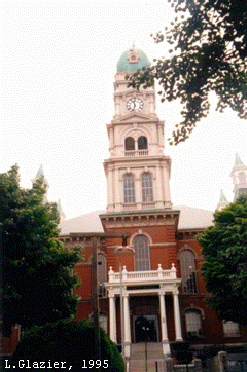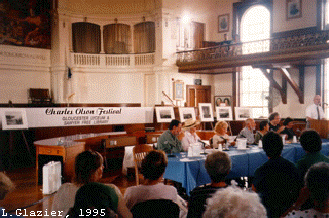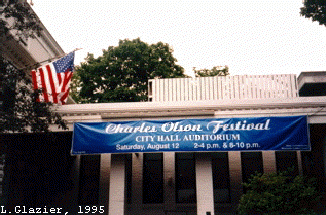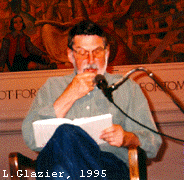The Charles Olson Festival
Honoring the Life and Work of Charles Olson:
Poet, Teacher, scholar & Community Activist
August 12, 1995
Gloucester City Hall, Gloucester, Mass.
A Report
by Loss Pequeño Glazier
[Special thanks to the Poetry Project Newsletter, where this
report was first printed.]
i.
THIS FESTIVAL, which seemed to me under-advertised, certainly
had no lack of attendance. The grand City Council Chamber of the
Gloucester City Hall was packed from its main floor to its balcony
curving around three quarters of the high-ceiling hall, despite
nearly unbearable heat (and David McArdle pointed out that the
heat was not inappropriate: Olson himself had stood in this same
room to argue for the preservation of Gloucester on some equally
sultry nights). The hall bore a festival banner beneath a colorful
mural of historic Gloucester emblazoned with the words, "Build
Not For Today But For Tomorrow As Well" (to which Creeley
during his comments added, "and for yesterday") and
enormous prints of Lynn Swigart's photographs from Olson's
Gloucester (Louisiana State University Press). Though some
of the attendees had traveled some distance to the conference-getting
there however possible-what struck me most about this festival
was its local presence.
 Many of the 350 persons attending were people from the community, many
of them older; my thought was that there was at least a 50% attendance
by the local community, probably considerably more. Some of these
people I spoke to had shown up because they remembered Olson or they
had seen the Festival announced in the local paper. One fisherman I
spoke to felt it was a necessary civic act. A woman I met on the
harbor ferry came because "my son used to play with Charlie's
son." Another man, dressed in work clothes and entering the hall
just as Gerrit Lansing was reading from Olson's letters to The
Gloucester Daily Times (Ten Pound Island) would say no more,
when asked, than "It's respects I have to pay."
Many of the 350 persons attending were people from the community, many
of them older; my thought was that there was at least a 50% attendance
by the local community, probably considerably more. Some of these
people I spoke to had shown up because they remembered Olson or they
had seen the Festival announced in the local paper. One fisherman I
spoke to felt it was a necessary civic act. A woman I met on the
harbor ferry came because "my son used to play with Charlie's
son." Another man, dressed in work clothes and entering the hall
just as Gerrit Lansing was reading from Olson's letters to The
Gloucester Daily Times (Ten Pound Island) would say no more,
when asked, than "It's respects I have to pay."
1.
MODEST IN SCALE BUT GRAND in sentiment, qualities of words, and
the vista of Gloucester harbor from the stairway windows of City
Hall, the Charles Olson Festival, presented by the Gloucester
Lyceum and Sawyer Free Library, consisted of three events in one
day to celebrate Olson's life and work twenty-five years after
his death: an afternoon panel discussion, a reception at the library
across the street, and a reading of Olson's works the same night.
 The panel, consisting of Robert Creeley, Vincent Ferrini, Hettie
Jones, Jean Kaiser, Ingeborg Lauterstein, Edward Sanders and ably
and enthusiastically moderated by Peter Anastas, undertook a number
of appreciative recollections and questions in the spirit of a
homage. The panelists all knew Olson personally, whether as student,
friend, or peer. Following an opening welcome by David McArdle,
director of the Gloucester library (a place where being "the
librarian" resonates more than in most places), questions
such as the panelists' impressions upon first meeting Olson, thoughts
about his work as a teacher, activist, and political poet were
entertained, with Anastas (who cited Olson's advice, "Just
live, the writing will take care of itself" as having been
crucial to him personally) raising questions and querying panelists
one by one.
The panel, consisting of Robert Creeley, Vincent Ferrini, Hettie
Jones, Jean Kaiser, Ingeborg Lauterstein, Edward Sanders and ably
and enthusiastically moderated by Peter Anastas, undertook a number
of appreciative recollections and questions in the spirit of a
homage. The panelists all knew Olson personally, whether as student,
friend, or peer. Following an opening welcome by David McArdle,
director of the Gloucester library (a place where being "the
librarian" resonates more than in most places), questions
such as the panelists' impressions upon first meeting Olson, thoughts
about his work as a teacher, activist, and political poet were
entertained, with Anastas (who cited Olson's advice, "Just
live, the writing will take care of itself" as having been
crucial to him personally) raising questions and querying panelists
one by one.
Creeley, generously offering much thoughtful information, spoke
eloquently on many issues. Given his extensive written contact
with Olson and the number of Olson's works he has edited, his
insights added a specific literary and personal grounding to the
event.
One important issue raised by the panel was the context of Olson
as an activist. Ed Sanders, given his own relevant activities
in this area, was the first to elaborate on this issue. Creeley
addressed the vast imagination of Olson's civic commitment (whether
or not this could be considered "political" poetry was
not investigated at length by the panel), noting Olson's distinction
between "epicene poets-poets who do not enter the society"
and the kind of poetic Olson engaged in Gloucester.
Vincent Ferrini, wearing a broad-brimmed hat and dark glasses,
provided numerous opinionated comments, quirky at times, and read
a poem written for the occasion. He also noted good-naturedly
his contention with Olson about "who had Gloucester"
for poetry. Hettie Jones was warm, kind, and provided personal
and valuable reflections about Olson and his engagement with Yugen
(a distinctly supportive little magazine-with Hettie providing
a crucial role-for Olson when most valuable to him).
And size, yes, about Olson's size. (The best comment on this point
was Ferrini's, who stated quite succinctly, "he lived his
body as a poem".)
Ingeborg Lauterstein, a successful novelist who started out as
an artist at Black Mountain until she became one of Olson's students,
and Jean Kaiser, the sister of Olson's late wife, Betty, both
provided important details and recollections about Olson. Ed Sanders,
who seemed hesitant at times about such a panel format, never
lacked in eloquence or opinion when prompted. Somewhat thorny,
though bypassed for the most part, was Olson's relation to women.
Of course the context was personal here in large part, and in
this regard, women on the panel spoke from their own interactions
with Olson. The point probably was not any resolution but some
tangible public fact. (It was similar when the issue of Olson's
"readability" came up, especially given the local character
of his work. It was a question I had also asked of some Gloucester
residents. Those that had tried to read his work had not had much
success.)
What counted, in terms of the festival, were the contributions
that Olson made to the community. Though many of the ecologically
important locations Olson argued for have now been paved over
or filled in and covered with condos, his efforts were specific;
he intensively argued issues crucial to Gloucester. Gloucester
was his polis and he lived his commitment to it, both in writing
and in action. The panel served to commemorate a remarkable contribution
to this commitment. In Ed Sander's words, "He was imperfect
but he was generous." It's safe to say, I think, that almost
everyone there, panelists and audience (local and visiting), were
motivated by that sense of generosity as detailed in the panel.
The question period was an event in itself and consisted of a
number of unanticipated spontaneous individual testimonials about
other personal (and life-changing) encounters with Olson.
The panel was followed by a reception at the library, featuring
wild blueberries from Dogtown, a showing of a 1966 KQED/National
Educational Television film on Olson, and greetings from the city
by the Mayor, Bruce H. Tobey.
2.
 THE HEAT ONLY SEEMED TO INTENSIFY BY EVENING but the main floor and
balcony of City Hall were full again. The evening event, introduced by
Schuyler Hoffman, was a reading of works by and about Olson, delivered
by Gerrit Lansing, Hettie Jones, Robert Creeley, and Edward
Sanders. Lansing read from Olson's letters to the Gloucester Daily
Times (Maximus to
Gloucester; The Letter and Poems of Charles Olson to the
Gloucester Times, 1962 - 1969, Ten Pound Island), reflecting on
Olson's method of working: that he might start writing a letter and it
would turn into a poem, and end up an essay (or something to that
effect). Indeed, the letters read by Lansing were so intensely poetic
at times, they must be considered part of Olson's poetic
oeuvre. Hettie Jones read sections from her memoirs reflecting on
Olson's visit to her (and her then husband LeRoi Jones) and their
household in New York. Her warm and deeply personal account of the
visit included interesting observations about her production labors in
trying to prepare Olson's manuscripts for Yugen.
THE HEAT ONLY SEEMED TO INTENSIFY BY EVENING but the main floor and
balcony of City Hall were full again. The evening event, introduced by
Schuyler Hoffman, was a reading of works by and about Olson, delivered
by Gerrit Lansing, Hettie Jones, Robert Creeley, and Edward
Sanders. Lansing read from Olson's letters to the Gloucester Daily
Times (Maximus to
Gloucester; The Letter and Poems of Charles Olson to the
Gloucester Times, 1962 - 1969, Ten Pound Island), reflecting on
Olson's method of working: that he might start writing a letter and it
would turn into a poem, and end up an essay (or something to that
effect). Indeed, the letters read by Lansing were so intensely poetic
at times, they must be considered part of Olson's poetic
oeuvre. Hettie Jones read sections from her memoirs reflecting on
Olson's visit to her (and her then husband LeRoi Jones) and their
household in New York. Her warm and deeply personal account of the
visit included interesting observations about her production labors in
trying to prepare Olson's manuscripts for Yugen.
 Creeley read some of Olson's work he had selected for Olson's
Selected Poems (California) with great acumen and feeling.
With both Lansing and Creeley's readings, what was most emphasized
were the words themselves, Olson's words, and in those cases there
was a particular pleasure in hearing them in the venue of the
Gloucester City Hall.
Creeley read some of Olson's work he had selected for Olson's
Selected Poems (California) with great acumen and feeling.
With both Lansing and Creeley's readings, what was most emphasized
were the words themselves, Olson's words, and in those cases there
was a particular pleasure in hearing them in the venue of the
Gloucester City Hall.
Ed Sanders concluded the evening with his own compositions, poems
by Olson set to music by Sanders. Plucking a stringed instrument,
the arrangement alternated between sections of sung text, reminiscent
to me of Ginsberg doing Blake (and in fact I believe it was Sanders
who made a point of placing Olson's work on a scale with Blake's)
and brief interludes or bridges of spoken words. This careful
interpretation provided an apt and festive conclusion to what
was perhaps the most articulate segment of the Festival, the word
itself. A word still there.
3.
BACK OUTSIDE IN THE NIGHT, a few parting words, then groups of
attendees began to disperse. Mostly to cars or just in directions
that seemed natural for them. This was my first visit to Gloucester
and as such continually offered a new sight around every corner.
I had, in fact, never even been to New England before. The event
seemed unusual compared to a lot of literary events because of
its strength of location and because of the participation by the
people who lived there. And of course, for them, once it was over,
they went home. Gloucester was home. For me, any direction would
do. But I walked towards the harbor.
 Many of the 350 persons attending were people from the community, many
of them older; my thought was that there was at least a 50% attendance
by the local community, probably considerably more. Some of these
people I spoke to had shown up because they remembered Olson or they
had seen the Festival announced in the local paper. One fisherman I
spoke to felt it was a necessary civic act. A woman I met on the
harbor ferry came because "my son used to play with Charlie's
son." Another man, dressed in work clothes and entering the hall
just as Gerrit Lansing was reading from Olson's letters to The
Gloucester Daily Times (Ten Pound Island) would say no more,
when asked, than "It's respects I have to pay."
Many of the 350 persons attending were people from the community, many
of them older; my thought was that there was at least a 50% attendance
by the local community, probably considerably more. Some of these
people I spoke to had shown up because they remembered Olson or they
had seen the Festival announced in the local paper. One fisherman I
spoke to felt it was a necessary civic act. A woman I met on the
harbor ferry came because "my son used to play with Charlie's
son." Another man, dressed in work clothes and entering the hall
just as Gerrit Lansing was reading from Olson's letters to The
Gloucester Daily Times (Ten Pound Island) would say no more,
when asked, than "It's respects I have to pay." The panel, consisting of Robert Creeley, Vincent Ferrini, Hettie
Jones, Jean Kaiser, Ingeborg Lauterstein, Edward Sanders and ably
and enthusiastically moderated by Peter Anastas, undertook a number
of appreciative recollections and questions in the spirit of a
homage. The panelists all knew Olson personally, whether as student,
friend, or peer. Following an opening welcome by David McArdle,
director of the Gloucester library (a place where being "the
librarian" resonates more than in most places), questions
such as the panelists' impressions upon first meeting Olson, thoughts
about his work as a teacher, activist, and political poet were
entertained, with Anastas (who cited Olson's advice, "Just
live, the writing will take care of itself" as having been
crucial to him personally) raising questions and querying panelists
one by one.
The panel, consisting of Robert Creeley, Vincent Ferrini, Hettie
Jones, Jean Kaiser, Ingeborg Lauterstein, Edward Sanders and ably
and enthusiastically moderated by Peter Anastas, undertook a number
of appreciative recollections and questions in the spirit of a
homage. The panelists all knew Olson personally, whether as student,
friend, or peer. Following an opening welcome by David McArdle,
director of the Gloucester library (a place where being "the
librarian" resonates more than in most places), questions
such as the panelists' impressions upon first meeting Olson, thoughts
about his work as a teacher, activist, and political poet were
entertained, with Anastas (who cited Olson's advice, "Just
live, the writing will take care of itself" as having been
crucial to him personally) raising questions and querying panelists
one by one.
 THE HEAT ONLY SEEMED TO INTENSIFY BY EVENING but the main floor and
balcony of City Hall were full again. The evening event, introduced by
Schuyler Hoffman, was a reading of works by and about Olson, delivered
by Gerrit Lansing, Hettie Jones, Robert Creeley, and Edward
Sanders. Lansing read from Olson's letters to the Gloucester Daily
Times (
THE HEAT ONLY SEEMED TO INTENSIFY BY EVENING but the main floor and
balcony of City Hall were full again. The evening event, introduced by
Schuyler Hoffman, was a reading of works by and about Olson, delivered
by Gerrit Lansing, Hettie Jones, Robert Creeley, and Edward
Sanders. Lansing read from Olson's letters to the Gloucester Daily
Times ( Creeley read some of Olson's work he had selected for Olson's
Selected Poems (California) with great acumen and feeling.
With both Lansing and Creeley's readings, what was most emphasized
were the words themselves, Olson's words, and in those cases there
was a particular pleasure in hearing them in the venue of the
Gloucester City Hall.
Creeley read some of Olson's work he had selected for Olson's
Selected Poems (California) with great acumen and feeling.
With both Lansing and Creeley's readings, what was most emphasized
were the words themselves, Olson's words, and in those cases there
was a particular pleasure in hearing them in the venue of the
Gloucester City Hall.
